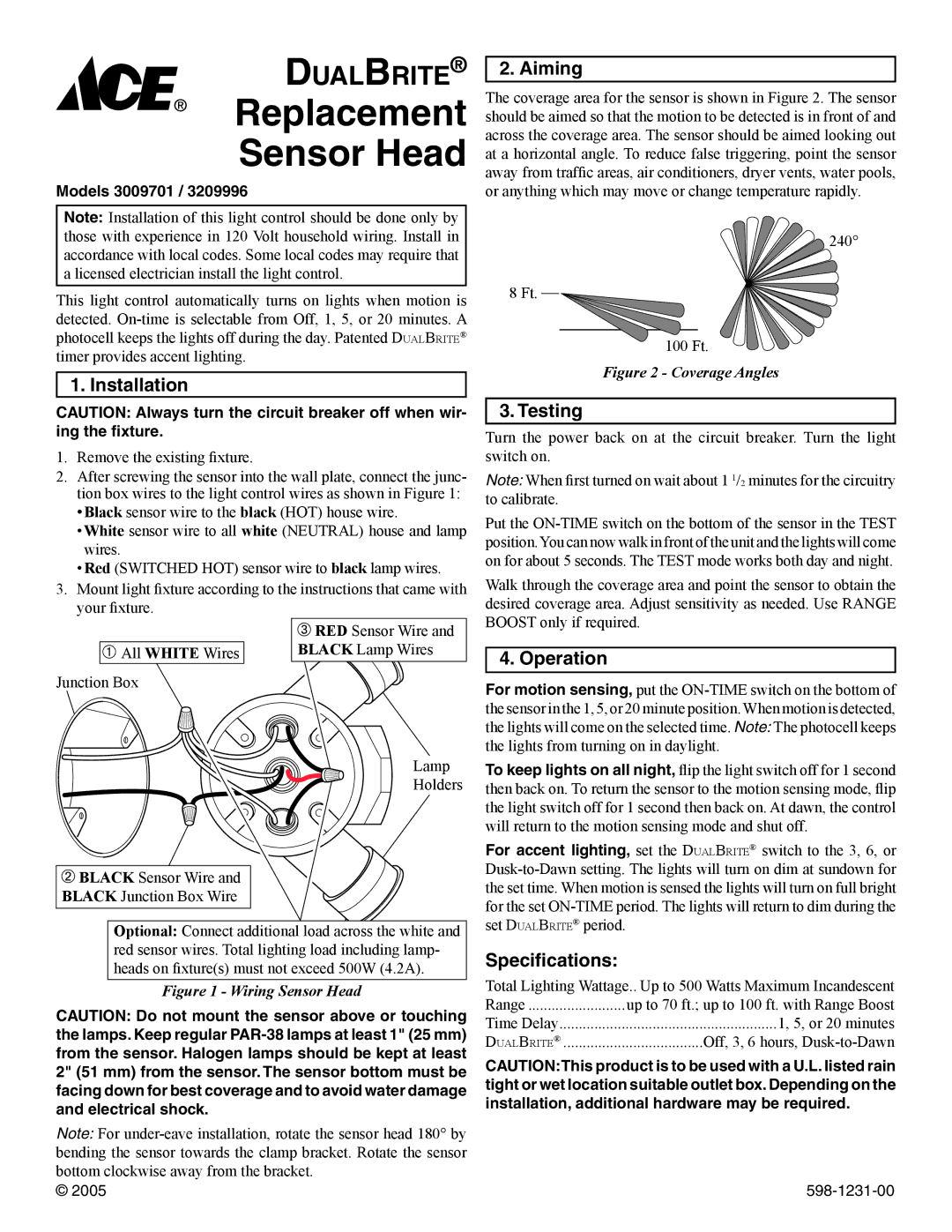
DUALBRITE®
Replacement
Sensor Head
Models 3009701 / 3209996
Note: Installation of this light control should be done only by those with experience in 120 Volt household wiring. Install in accordance with local codes. Some local codes may require that a licensed electrician install the light control.
This light control automatically turns on lights when motion is detected.
1. Installation
CAUTION: Always turn the circuit breaker off when wir- ing the fixture.
1.Remove the existing fixture.
2.After screwing the sensor into the wall plate, connect the junc- tion box wires to the light control wires as shown in Figure 1:
•Black sensor wire to the black (HOT) house wire.
•White sensor wire to all white (NEUTRAL) house and lamp wires.
•Red (SWITCHED HOT) sensor wire to black lamp wires.
3.Mount light fixture according to the instructions that came with your fixture.
2. Aiming
The coverage area for the sensor is shown in Figure 2. The sensor should be aimed so that the motion to be detected is in front of and across the coverage area. The sensor should be aimed looking out at a horizontal angle. To reduce false triggering, point the sensor away from traffic areas, air conditioners, dryer vents, water pools, or anything which may move or change temperature rapidly.
240°
8 Ft.
100 Ft.
Figure 2 - Coverage Angles
3. Testing
Turn the power back on at the circuit breaker. Turn the light switch on.
Note: When first turned on wait about 1 1/2 minutes for the circuitry to calibrate.
Put the
Walk through the coverage area and point the sensor to obtain the desired coverage area. Adjust sensitivity as needed. Use RANGE BOOST only if required.
![]()
![]() All WHITE Wires Junction Box
All WHITE Wires Junction Box
![]() RED Sensor Wire and BLACK Lamp Wires
RED Sensor Wire and BLACK Lamp Wires
Lamp
Holders
4. Operation
For motion sensing, put the
To keep lights on all night, flip the light switch off for 1 second then back on. To return the sensor to the motion sensing mode, flip the light switch off for 1 second then back on. At dawn, the control will return to the motion sensing mode and shut off.
![]() BLACK Sensor Wire and
BLACK Sensor Wire and
BLACK Junction Box Wire
Optional: Connect additional load across the white and red sensor wires. Total lighting load including lamp- heads on fixture(s) must not exceed 500W (4.2A).
Figure 1 - Wiring Sensor Head
CAUTION: Do not mount the sensor above or touching the lamps. Keep regular
Note: For
© 2005
For accent lighting, set the DUALBRITE® switch to the 3, 6, or
Specifications:
Total Lighting Wattage.. Up to 500 Watts Maximum Incandescent
Range | up to 70 ft.; up to 100 ft. with Range Boost |
Time Delay | 1, 5, or 20 minutes |
DUALBRITE® | Off, 3, 6 hours, |
CAUTION:This product is to be used with a U.L. listed rain tight or wet location suitable outlet box. Depending on the installation, additional hardware may be required.
